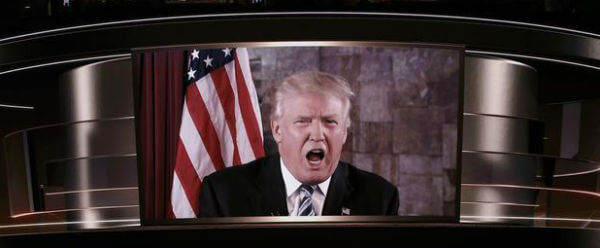
Reuters reports: If he wins the presidency, Republican presidential nominee Donald Trump would seek to purge the federal government of officials appointed by Democratic President Barack Obama and could ask Congress to pass legislation making it easier to fire public workers, Trump ally, Chris Christie, said on Tuesday.
Christie, who is governor of New Jersey and leads Trump’s White House transition team, said the campaign was drawing up a list of federal government employees to fire if Trump defeats Democratic rival Hillary Clinton in the Nov. 8 presidential election.
“As you know from his other career, Donald likes to fire people,” Christie told a closed-door meeting with dozens of donors at the Republican National Convention in Cleveland, according to an audio recording obtained by Reuters and two participants in the meeting.
Christie was referring to Trump’s starring role in the long-running television show “The Apprentice,” where his catch-phrase was “You’re fired!”
The Trump campaign did not respond to requests for comment.
Trump’s transition advisers fear that Obama may convert these appointees to civil servants, who have more job security than officials who have been politically appointed. This would allow officials to keep their jobs in a new, possibly Republican, administration, Christie said. [Continue reading…]


I’d like to believe that the US is not well advanced on its trajectory toward rightist minority rule. It’s just that there’s so little evidence to the contrary.
One thing it took me many years to recognize about Americans is that there is a genuine sense of egalitarianism in this society, despite its glaring inequalities. As a result, members of the educated elite have a hard time reconciling their identity as Americans with the chasm that separates them from the millions of Americans who are staggeringly ignorant. To acknowledge that divide is to risk losing a sense of living among fellow Americans.
When Trump says things like, “We are going to take care of this country first before we worry about everyone else in the world,” he’s tapping into a deeply populist sentiment. And he’s echoing the ignorance embedded in America’s self-image that this country gives much more to the world than it receives in return.
What makes Trump so hard to challenge is that it’s impossible to confront his ignorance without confronting the ignorance that permeates American society. To attempt to do that is to instantly marginalize oneself because it’s impossible to make this observation without being perceived as having a condescending attitude towards ordinary Americans. The problem is further compounded by the fact that in this country, more so, I suspect, than any other, there is very little shame attached to ignorance. People commonly think they know just as much as they need to know. No one illustrates this more than Trump himself.
I bet Erdogan had those lists ready.
Paul, your comment reminded me of my country. Here the people elected a man who, as a presidential candidate campaigning at a book fair, had a very hard time naming three books that were influential in his life. The first time I saw the video I, along with many others, thought that the incident would sink his campaign. Such a blatant display of ignorance should scare voters away, hey?
Not quite. Later on I thought that if you are a person who has very little curiosity to find out what’s outside the little world of television; if you’re an ignorant person, why would you feel ashamed to elect a man who resembles you? On the contrary, I thought, you’re going to feel that there is something in common. You might as well vote for that guy just to shove your vote on all those odious intellectuals who believe they’re so fucking smart.
I don’t think there’s any question Erdogan is using lists that were compiled before the coup. Without tearing pages out of phone books or employing some other absurd method of gathering names, it would be physically impossible to construct an enemies list in such a short space of time.
This then conjures the image of the Turkish government spending years compiling data about the “enemy within” and maybe that’s part of the story. But I think the other part is that this is a far-reaching network of people who, not long ago, were seen as Erdogan allies.
On this issue of popular ignorance, yes, there is always the danger that voters are going to gravitate towards the people they most easily identify with. And I think we’re currently suffering the effects of insufficient attention being given to public discussion on the nature of democracy.
In a representative democracy we are delegating the day-to-day responsibilities of decision-making in public affairs to representatives who act on our behalf. These representatives are not slaves of popular will. There has to be give and take — responsiveness balanced with the willingness to exercise informed leadership.
There’s a cynical view that people get the government they deserve, but on the contrary we deserve better governments than we imagine.
I like your analysis of why it’s so hard to critique Trump, Paul. Spot on! I think all this reflects on the dire state of American education. The public are not taught to think critically, and this crisis in our democracy is, at least in part, the result. Some education in civics wouldn’t go amiss either!